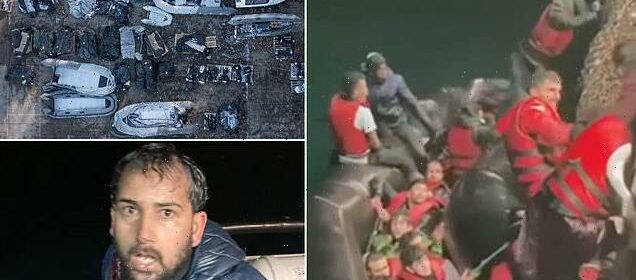50 migrants were rescued from SECOND sinking boat

Revealed: 50 migrants were rescued from SECOND sinking boat on night that four died in the Channel
- A second migrant boat had to be rescued from the Channel the night four died
- Border Force officers rescued 50 people, five of whom were in the water
- Their dingy capsized as they were attempting to travel across the Channel
- The National Crime Agency is investigating the smuggling gang involved
Migrants were rescued from a second sinking boat on the same night four people died in the Channel.
Border Force officers rescued 50 people, five of whom had ended up in the freezing water, after their boat started to sink on the same night a major search and rescue operation was launched when a dinghy capsized, Government officials said.
Detectives from Kent Police are now investigating the circumstances surrounding the incident in the early hours of Wednesday morning which left four dead and saw 39 rescued alongside the National Crime Agency (NCA), amid reports that those on board paid thousands of pounds to people smugglers to make the journey to the UK.
Officers are also trying to identify the people who died and track down their relatives, the force said on Friday.
A second boat with migrants seeking to cross the English Channel had to be rescued on the same night for people died when their inflatable dingy started taking on water
Earlier this week, Prime Minister Rishi Sunak announced more funding for the NCA – Britain’s version of the FBI – to tackle organised immigration crime in Europe
The search was called off at 5pm on Thursday.
Migrants on board the dinghy told fishermen they had paid £5,000 each to people smugglers for the journey from France to the UK, according to media reports.
Earlier this week, Prime Minister Rishi Sunak announced more funding for the NCA – Britain’s version of the FBI – to tackle organised immigration crime in Europe.
NCA director-general Graeme Biggar said: ‘This incident, tragically, highlights the dangers of these crossings, a high percentage of which are facilitated by organised criminal networks.
‘They treat people as a commodity to be profited from and think nothing of putting them in incredibly dangerous situations. Working with our partners on both sides of the Channel we are determined to find those responsible and bring them to justice.’
The NCA is also involved in the French probe into the deaths of at least 27 migrants in the Channel last year.
Migrants on board the dinghy told fishermen they had paid £5,000 each to people smugglers for the journey from France to the UK
Meanwhile, a senior retiring army officer is to take charge of the Government’s new unit being launched next year in a bid to crack down on Channel crossings.
Major General Duncan Capps, a former head of the army training college at Sandhurst, will take on the role of clandestine Channel threat commander from Daniel O’Mahoney who is standing down after two-and-a-half-years, it is understood.
Considered by officials to be an extremely experienced leader, Mr Capps, who retires as an army officer this month, will head up the ‘small boats operational command’ unveiled by the Prime Minister earlier this week as part of a raft of new measures in a bid to grip the migrant crisis.
The ‘permanent, unified’ unit will bring together military and civilian staff alongside the National Crime Agency (NCA) to coordinate ‘intelligence, interception, processing, and enforcement’, Rishi Sunak told MPs.
The move means control of the operation is being handed back to the Home Office at the end of January after then prime minister Boris Johnson put the Ministry of Defence (MoD) in charge in April.
But officials – who are keen to stress the shift will mark a fundamentally different approach to tackling crossings – anticipate some ongoing military support will still be needed.
Some 730 additional Border Force staff will be hired to work as part of the command, although some may be seconded from places like the MoD and NCA.
Around 100 of those will work in the London headquarters – split across the Home Office and the NCA – while the remainder will be frontline staff, based mostly in Dover but also in Manston in Kent.
But it could take up to a year for the teams to be in post as a result of the time the recruitment process and training will take.
Former Royal Marine Mr O’Mahoney’s role was considered ‘vital’ by the former home secretary Priti Patel to crack down on crossings and make the route from France to the UK ‘unviable’ when she hired him in August 2020.
An average of just 12 migrants were making the crossing per boat when he started but this has since risen to 47 in October this year, officials said.
At that time, 400 people making the journey in one day was seen as major influx of arrivals whereas now that figure is considered business as usual, with daily numbers now sometimes surpassing 1,000.
Source: Read Full Article


